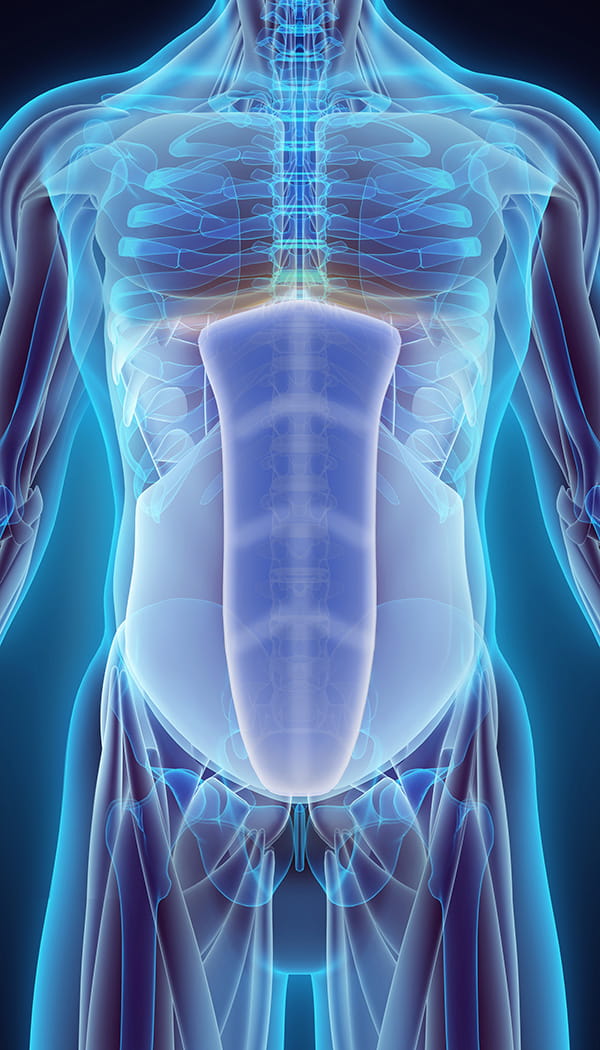What is a hernia?
A hernia happens when an organ pushes through an opening in the abdominal wall, diaphragm, belly button or groin. While they are often not life-threatening conditions, they can be very uncomfortable and negatively impact quality of life. Hernias also cannot go away without treatment.
There are many different types of hernia
- Inguinal or femoral – intestine or bladder pushing through the core in the inguinal canal of the groin
- Ventral, including:
- Incisional – intestine pushing through the core at a weak spot caused by previous surgery in the abdomen
- Umbilical – intestine pushing through the core at the belly button
- Epigastric – weakening or hole above the belly button at the base of the rib cage
- Parastomal – weakening around an ostomy allowing intestine to push alongside the ostomy
- Hiatal – upper part of the stomach pushes through the diaphragm
What causes a hernia?

Hernias occur when there is a muscle weakness that allows the intestine (or even other organs) to push through the abdominal core. This can happen for many reasons, including:
- Previous operation creating a weakness
- Heavy lifting (typically with incorrect form)
- Diarrhea or constipation
- Obesity
- Smoking
- Long-term coughing or sneezing
Abdominal muscle weakness can also be present at birth, but not cause problems until later in life.
How is a hernia diagnosed?
In many cases, a physician or nurse practitioner will be able to actually feel the hernia while performing a physical exam. If the hernia is not detectable by touch, the physician or nurse practitioner may order an abdominal ultrasound, CT scan or MRI.
Hernia symptoms
While each type of hernia can have different symptoms, most commonly patients experience:
- Pain/discomfort in the area of the hernia
- A heavy feeling or pressure in the abdomen
- A detectable bulge in the affected area
Hernia treatment options
If the hernia is not causing acute health issues, or inhibiting quality of life, it can sometimes be monitored for change without having surgery.
However, surgical intervention is often needed to treat hernias, especially when the symptoms impact your quality of life. Ohio State provides a variety of surgical options, including minimally-invasive and robotic procedures and complex abdominal wall (core) reconstructions.
Hernias have a high rate of recurrence, so surgeons often use surgical mesh to provide extra support across a wider area in order to reduce the chances that a hernia will reappear. Surgical mesh is a screen-like material made of polymers.
The vast majority of inguinal hernia repairs are done using mesh, because it is frequently the best treatment option for lasting repair.
However, surgeons at The Ohio State University Wexner Medical Center are equally well-versed in no-mesh procedures, which use your own tissues to help prevent an inguinal hernia from coming back.
Our surgeons are among the few in central Ohio trained in the no-mesh option called the Shouldice repair. This method of inguinal hernia repair, which involves stitching multiple layers of tissue together to provide support, requires special training and experience.
Patients who choose Shouldice inguinal hernia repair also receive long-term follow-up through the Abdominal Core Health Quality Collaborative, a national organization that’s dedicated to improving outcomes and hernia patient care.
Is no-mesh repair appropriate for other types of hernia?
For smaller ventral hernias (< 2 cm), such as umbilical or epigastric hernias, no-mesh repairs can be done using your own tissues to help prevent the hernia from coming back, but this requires physician evaluation on an individual basis. Patients must have a BMI of less than 30 and their hernia cannot have had a previous repair.
Why choose Ohio State?
- We treat hernias effectively the first time—or we can repair damage from previous operations.
- We develop a personalized care plan, providing the best treatment options for you that will improve your quality of life. Ohio State Wexner Medical Center helped develop and is the first health center in the nation to adopt the formal rehabilitation protocol for abdominal core surgery issued by the Abdominal Core Health Quality Collaborative (ACHQC), a national quality improvement effort in hernia surgery.
- We also serve as a data coordination center for the ACHQC to improve hernia treatment worldwide.
- Because we’re part of one of the nation’s largest academic health centers, we can collaborate with nearly any kind of specialist to personalize a treatment plan that suits each patient’s unique condition and individual goals.
- Our team also conducts ongoing research, so patients can participate in studies that include innovative treatment options.
Helpful Links
How would you like to schedule?
Don’t have MyChart? Create an account
Get an estimate for this and other services
Get an instant estimate for your out-of-pocket costs. Learn more.
Login to MyChart
As a MyChart user, you can pre-populate an estimate with your existing insurance information, receive personalized estimates and save your estimates for later.
Don't have a MyChart account? Create an account





